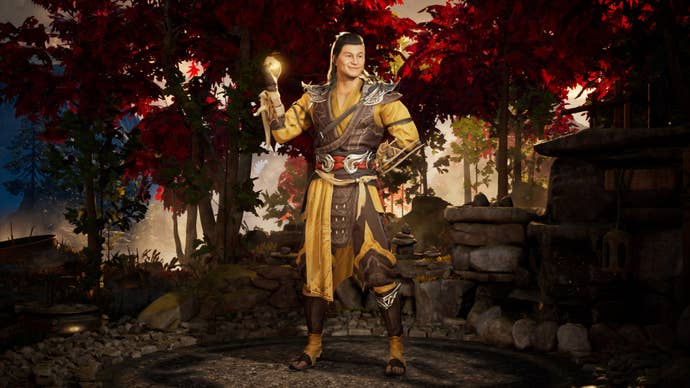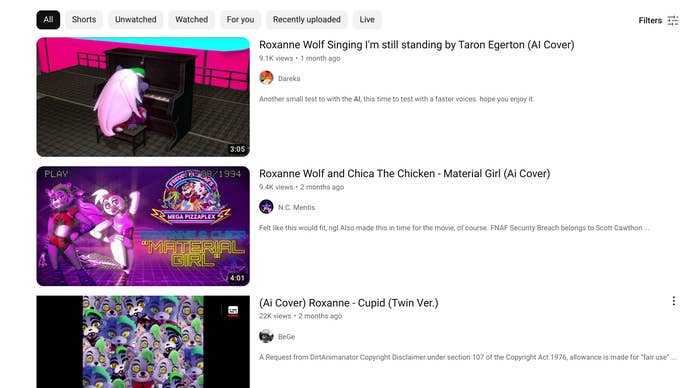Products You May Like
It should not be a controversial stance to believe that you, as an actor, own your own voice. However, this belief is at the center of what could be a second major video game voice actor strike. The second such strike in a decade.
On September 1, SAG-AFTRA – an American union representing artists across various mediums including video games – announced its decision to seek strike authorization from voice actor artists it represents. If approved, SAG-AFTRA will gain a powerful tool as it re-enters negotations with video game giants including EA, Activision, and Insomniac. A tool that proved vital for WGA writers that struck a tentative deal early this morning and essential for voice actors back in 2016.
With the deadline of the vote looming later today, we spoke to actors from some of the most popular games this year about why they believe now is the time to take a stand.
“I would have hoped we’d have done this sooner,” states Alan Lee, the US-based actor who voiced Shang Tsung in Mortal Kombat 1. Protections against unrestrained use of AI are one of the primary demands from SAG-AFTRA, and an issue Lee has strong feelings on. “It has already infiltrated audiobooks, niche areas of voice acting and the arts. Once they breach through, it’s only a matter of staving it off and doing damage control so it slows down for upcoming generations. But once it’s here, it’s here.”
Lee is one of many actors that doesn’t consent for his voice to be used in AI projects. Others include Jennifer English, voice actor for Shadowheart in Baldur’s Gate 3, who recounts the uncomfortable nature of her own situation.
“It’s terrifying to hear your voice saying things you would never say, even as a joke!” she explains. “I’ve had it done to me, and it feels so invasive and scary. Anyone can make me say anything, and it’s not okay.”
Marta Svetek, another UK-based actor who you may know as Roxxane Wolf from the popular Five Nights at Freddy franchise, agrees. “When you hear your voice saying something you would never say, but it’s your voice… It’s so real! You feel such a profound feeling of violation. It’s hard to describe how viscerally violated I felt when I heard it.”
The key issue is consent, per Svetek. “We can appeal to businesses all we want, we can have these strikes – and I do think these things will help mitigate the damage AI is doing to our industry. But it’s going business-to-business and asking them to pinky swear not to develop internal systems that they can feed this data to.
“What needs to happen is government intervention. There needs to be an amendment to copyright law and intellectual property legislation. That’s the daunting part.”
Sunil Malhotra – who played Kung Lao in Mortal Kombat 1 and Chief Kane Herath Starfield – was part of the strikes back in 2016. He sums up the AI issue succinctly: “Right now, without protections, it is very possible that a few things will happen. [Publishers] will continue to use our work and labour to train their systems that will eventually put us out of work. That is unacceptable. We must own our voice, literally. You cannot just take our voice without our consent and compensation.”
Speaking of compensation, that’s another issue raised by actors that are considering strike action. Over the past few years, daily life has become increasingly expensive, with the US suffering from a cumulative inflation rate of roughly 25% since 2017, when the last voice actor strike ended.

“It costs more to get things,” says Malhotra. “It costs more to go to the grocery store, I went to Subway recently and I went ‘oh my God!’ It’s so much more expensive now, everything is. Our wages have not gone up in accordance with [inflation]. The proposal we’re asking for isn’t even a raise, which we deserve! [Publishers] made $19 billion dollars last year. We deserve a raise.”
Lee echoes this sentiment, emphasising the impact residuals would have for voice actors. “You have instances where celebrities like Keven Spacey are playing roles in video games, there is clearly a lot of money being made here. Video games are a multi-billion dollar industry […] A lot of people who are doing this are making a couple thousand dollars – certainly less than $10,000! – per project. And projects are hard to get! The fact that we don’t have residuals to help us get from gig to gig is comically evil.”
Many voice actors resort to working multiple jobs, needing to work in other industries in order to make ends meet. Svetek is one such example, currently working in a visual effects company alongisde her voice acting work. “With whatever I make in voice over, I would be probably living paycheck-to-paycheck. I’d just about be able to live with the bare minimum in London.
“You can certainly make a living with voice over. If you get enough commercial or corporate work and that kind of stuff… You won’t be rich by any means, but you can make a living. Just voice acting on video games? It’s not possible to make a living in this country.”

She continues: “There’s a saying: when America sneezes the whole world gets a cold. It works in a positive way as well! The US very much sets the standard. The companies work internationally, so if there are productions based in the US, I’ve seen in the past that it’s driven up the overall VO budget. Which allows them to pay us better. It’s a project-to-project kind of thing, but it does set a standard and makes it easier to negotiate.” Unlike regional strikes, a strike in the video game sector could change things beyond national borders, with actors from all over the world working in solidarity to bring attention to a common cause.
Whether or not a strike is on the cards will be revealed later today, giving negotiators on the actors’ side more bargaining power. But with the existential worries surrounding AI and an untenable cost of living crisis resulting in mounting pressure for actors around the world, the battle for the voice of the video game industry may be about to kick off in earnest – just as the world’s eyes start to turn away from the WGA.
